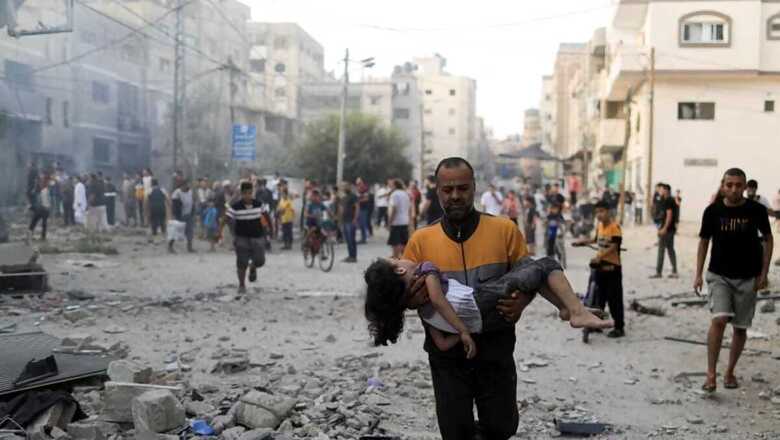
views
Blaring sirens every few hours, missiles dropping a few kms away, running from the room to the bunker within a few seconds to make it in time, and living under constant fear of what was going to be the next is how Indian students recount their last few days in war-torn Israel before they were safely evacuated back to India.
While the sound of sirens to alert there’s a missile about to be dropped was not entirely new to these students who have been there for some time and have done the drill of running to a safe shelter upon the sound of it, this time it was different, and the sense of fear much deeper.
Sravya Rao, a PhD student, pursuing research in electro-optical engineering was woken up by the sound of one such siren on October 7, the first day when the Hamas militant group attacked Israel, firing thousands of rockets towards its southern and central regions.
“It was 6:30 am when a siren blowing outside woke me up and I ran to the bunker on my floor. Until then I thought this was one of those sirens, but then there was another one sometime later and as the news broke everywhere, videos of killings and militants armed with guns getting into the cities started floating around, as you see in the movies, nobody expects that to happen in real. This is when the fear and the scale of the attack struck us. My grandfather back in India was the first one to spot the news on television and told it to my parents, who then called me in panic. I had to assure them that the university was safe, as there was no other option,” said Rao, who is enrolled in a university in Beersheba, southern Israel, 40 kms away from the Gaza border.
Within an hour and a half or so of the first siren, said Rao, the university told students that it was a terror attack. Not many students were there in the dorm, as the semester was to start from October 17. “Nobody expected that a war would start. We thought it was just bomb shelling and would stop, but it wasn’t so. Even though this was the situation, we had supplies, and the supermarket on the campus was open. It was just the larger fear that remained all the time. At that time we didn’t know we would be evacuated or anything like that. Our WhatsApp group of Indian students, who also has an Indian embassy representative on it told us to fill in our information with it just in case. Then a day later we got an email informing us of the evacuation process,” said Rao, who came on the first flight that brought Indians, mostly students, back on October 14.
Now back to Bangalore with her family, the research student said that she’s just waiting for the violence to stop to go back while the university had postponed the semester to November 5.
While everyone here has apps sharing prior information on the bomb-shelling allowing people to move to a safe shelter, this was the first time there was infiltration with armed militants roaming about the cities, which caused the maximum damage. The attack happened on a day that marked the end of a festival while everyone was having a relaxed day.
Most of the students who got back are those pursuing research, as Israel is known for its research institutions in science and math.
Binita Ghosh, another research fellow, enrolled in a university in Tel Aviv, central Israel, said that there was a siren that woke her up after which she woke up a few others to rush to the bunkers. “In Tel Aviv, you have 90 seconds to make it to the bunker. I had heard a siren only once or twice since I joined the university here last year, but this one was different. Some relatives had shared some videos of the attack with my parents, who got too scared and told me to not worry about the money, but just book the first flight home,” said Ghosh, pursuing research in biology, who hails from Ranchi, Jharkhand.
But, she added, the Indian embassy here has been really helpful. They answered calls and gave even mental and emotional support till the evacuation. “Even the university had Zoom sessions with us addressing our concerns,” she said.
However, looking back, Ghosh said she feels sad that humans are being killed all around and even when she does go back, things will not be the same. “It’s hard to see a place where you have lived for over a year and made friends to be devastated in this manner. Even when institutions will open up eventually, it won’t be the same,” she said.
Alok Mishra, a research scientist in central Israel, who too came back on the same flight back to India, said that he knew it was kind of an attack when the siren kept on blaring continuously in the morning. It was different because there was the smell of smoke all around. One could see clouds of smoke as a rocket had landed just about a kilometre away. “We keep getting information and emergency alerts of when and where the rocket fell. They even rectify the information in case of a false alarm and don’t hide information at all”, said Mishra, who belongs to UP’s Pratapgarh.
He said that he has travelled to many European cities as well, but Israel has the best work and social culture. “There people will help you even if they don’t know you, be it an issue with food or anything, they will make sure you are helped. It’s the saddest thing that we had to come back this way amid people dying back there. But, we look forward to going back soon,” said Mishra.


















Comments
0 comment